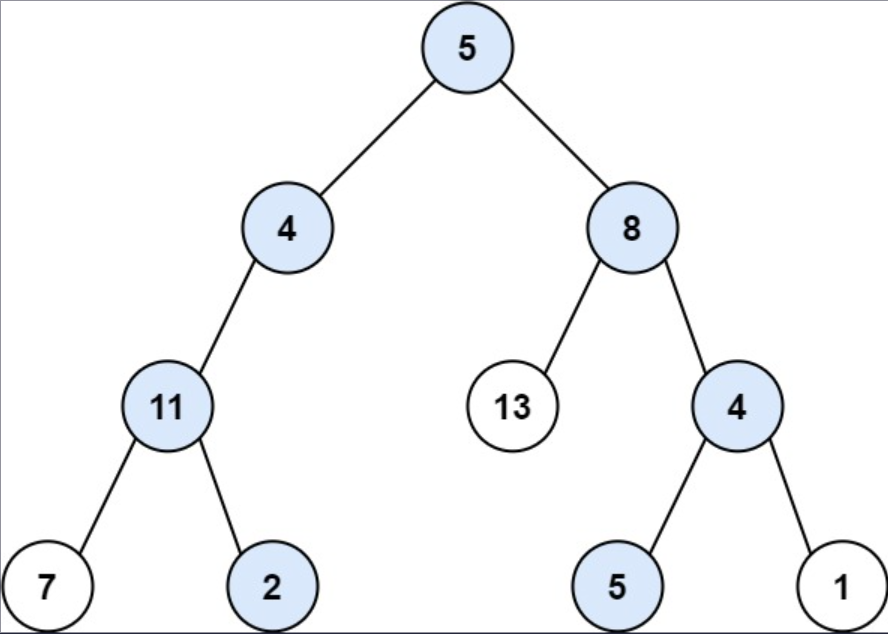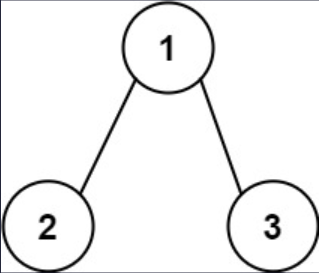2023/12/30大约 4 分钟
一、题目描述
给你二叉树的根节点root和一个整数目标和targetSum,找出所有从根节点到叶子节点路径总和等于给定目标和的路径。
叶子节点是指没有子节点的节点。
示例 1
输入: root = [5, 4, 8, 11, null, 13, 4, 7, 2, null, null, 5, 1], targetSum = 22
输出: [[5, 4, 11, 2], [5, 8, 4, 5]]
示例 2
输入: root = [1, 2, 3], targetSum = 5
输出: []
示例 3
输入: root = [1, 2], targetSum = 0
输出: []
提示
- 树中节点总数在范围
[0, 5000]内 -1000 <= Node.val <= 1000-1000 <= targetSum <= 1000
相关主题
- 树
- 深度优先搜索
- 回溯
- 二叉树
二、题解
Rust节点定义
#[derive(Debug, PartialEq, Eq)]
pub struct TreeNode {
pub val: i32,
pub left: Option<Rc<RefCell<TreeNode>>>,
pub right: Option<Rc<RefCell<TreeNode>>>,
}
impl TreeNode {
#[inline]
pub fn new(val: i32) -> Self {
TreeNode {
val,
left: None,
right: None,
}
}
}Java节点定义
public class TreeNode {
int val;
TreeNode left;
TreeNode right;
TreeNode() {}
TreeNode(int val) { this.val = val; }
TreeNode(int val, TreeNode left, TreeNode right) {
this.val = val;
this.left = left;
this.right = right;
}
}方法 1: 深度优先搜索
Rust
pub fn path_sum(root: Option<Rc<RefCell<TreeNode>>>, target_sum: i32) -> Vec<Vec<i32>> {
//Self::dfs_recur_1(root, target_sum
//Self::dfs_iter_1(root, target_sum)
Self::dfs_recur_2(root, target_sum)
}
fn dfs_recur_1(root: Option<Rc<RefCell<TreeNode>>>, target_sum: i32) -> Vec<Vec<i32>> {
let mut paths = vec![];
const RECUR: fn(Option<Rc<RefCell<TreeNode>>>, i32, i32, Vec<i32>, &mut Vec<Vec<i32>>) =
|root, target_sum, sum, mut path, paths| {
if let Some(curr) = root {
let curr_val = curr.borrow().val;
let curr_sum = sum + curr_val;
path.push(curr_val);
let left = curr.borrow_mut().left.take();
let right = curr.borrow_mut().right.take();
if left.is_none() && right.is_none() && curr_sum == target_sum {
paths.push(path);
} else {
if left.is_some() {
RECUR(left, target_sum, curr_sum, path.clone(), paths);
}
if right.is_some() {
RECUR(right, target_sum, curr_sum, path, paths);
}
}
}
};
RECUR(root, target_sum, 0, vec![], &mut paths);
paths
}
fn dfs_iter_1(root: Option<Rc<RefCell<TreeNode>>>, target_sum: i32) -> Vec<Vec<i32>> {
let mut paths = vec![];
if let Some(root) = root {
let mut stack = vec![(root, 0, vec![])];
while let Some((curr, sum, mut path)) = stack.pop() {
let curr_val = curr.borrow().val;
let curr_sum = sum + curr_val;
path.push(curr_val);
let left = curr.borrow_mut().left.take();
let right = curr.borrow_mut().right.take();
if left.is_none() && right.is_none() && curr_sum == target_sum {
paths.push(path);
} else {
if let Some(right) = right {
stack.push((right, curr_sum, path.clone()));
}
if let Some(left) = left {
stack.push((left, curr_sum, path));
}
}
}
}
paths
}
fn dfs_recur_2(root: Option<Rc<RefCell<TreeNode>>>, target_sum: i32) -> Vec<Vec<i32>> {
const RECUR: fn(Option<Rc<RefCell<TreeNode>>>, i32, i32) -> Vec<Vec<i32>> =
|root, target_sum, sum| match root {
None => vec![],
Some(curr) => {
let curr_val = curr.borrow().val;
let curr_sum = curr_val + sum;
let left = curr.borrow_mut().left.take();
let right = curr.borrow_mut().right.take();
if left.is_none() && right.is_none() {
let mut paths = vec![];
if curr_sum == target_sum {
paths.push(vec![curr_val]);
}
paths
} else {
let mut l_paths = RECUR(left, target_sum, curr_sum);
let mut r_paths = RECUR(right, target_sum, curr_sum);
l_paths.iter_mut().for_each(|p| p.insert(0, curr_val));
r_paths.iter_mut().for_each(|p| p.insert(0, curr_val));
l_paths.append(&mut r_paths);
l_paths
}
}
};
RECUR(root, target_sum, 0)
}Java
public List<List<Integer>> pathSum(TreeNode root, int targetSum) {
//return this.dfsRecur1(root, targetSum);
//return this.dfsIter1(root, targetSum);
return this.dfsRecur2(root, targetSum);
}
@FunctionalInterface
interface QuintConsumer<A, B, C, D, E> {
void accept(A a, B b, C c, D d, E e);
}
QuintConsumer<TreeNode, Integer, Integer, List<Integer>, List<List<Integer>>> recur1 = (root, targetSum, sum, path, paths) -> {
if (root == null) {
return;
}
int currSum = sum + root.val;
path.add(root.val);
if (root.left == null && root.right == null && currSum == targetSum) {
paths.add(path);
} else {
if (root.left != null) {
this.recur1.accept(root.left, targetSum, currSum, new ArrayList<>(path), paths);
}
if (root.right != null) {
this.recur1.accept(root.right, targetSum, currSum, path, paths);
}
}
};
List<List<Integer>> dfsRecur1(TreeNode root, int targetSum) {
List<List<Integer>> paths = new ArrayList<>();
this.recur1.accept(root, targetSum, 0, new ArrayList<>(), paths);
return paths;
}
List<List<Integer>> dfsIter1(TreeNode root, int targetSum) {
List<List<Integer>> paths = new ArrayList<>();
if (root != null) {
Deque<Object[]> stack = new ArrayDeque<>() {{
this.push(new Object[]{root, 0, new ArrayList<>()});
}};
while (!stack.isEmpty()) {
Object[] objs = stack.pop();
TreeNode curr = (TreeNode) objs[0];
int sum = (int) objs[1];
List<Integer> path = (List<Integer>) objs[2];
int currSum = sum + curr.val;
path.add(curr.val);
if (curr.left == null && curr.right == null && currSum == targetSum) {
paths.add(path);
} else {
if (curr.right != null) {
stack.push(new Object[]{curr.right, currSum, new ArrayList<>(path)});
}
if (curr.left != null) {
stack.push(new Object[]{curr.left, currSum, path});
}
}
}
}
return paths;
}
@FunctionalInterface
interface TriFunction<A, B, C, D> {
D apply(A a, B b, C c);
}
TriFunction<TreeNode, Integer, Integer, List<List<Integer>>> recur2 = (root, targetSum, sum) -> {
if (root == null) {
return new ArrayList<>();
}
int currVal = root.val;
int currSum = sum + currVal;
if (root.left == null && root.right == null) {
List<List<Integer>> paths = new ArrayList<>();
if (currSum == targetSum) {
paths.add(new ArrayList<>() {{
this.add(currVal);
}});
}
return paths;
} else {
List<List<Integer>> l_paths = this.recur2.apply(root.left, targetSum, currSum);
List<List<Integer>> r_paths = this.recur2.apply(root.right, targetSum, currSum);
l_paths.forEach(p -> p.addFirst(currVal));
r_paths.forEach(p -> p.addFirst(currVal));
l_paths.addAll(r_paths);
return l_paths;
}
};
List<List<Integer>> dfsRecur2(TreeNode root, int targetSum) {
return this.recur2.apply(root, targetSum, 0);
}方法 2: 广度优先搜索
Rust
pub fn path_sum(root: Option<Rc<RefCell<TreeNode>>>, target_sum: i32) -> Vec<Vec<i32>> {
Self::bfs_iter(root, target_sum)
}
fn bfs_iter(root: Option<Rc<RefCell<TreeNode>>>, target_sum: i32) -> Vec<Vec<i32>> {
let mut paths = vec![];
if let Some(root) = root {
let mut queue = VecDeque::from([(root, 0, vec![])]);
while let Some((curr, sum, mut path)) = queue.pop_front() {
let curr_val = curr.borrow().val;
let curr_sum = curr_val + sum;
path.push(curr_val);
let left = curr.borrow_mut().left.take();
let right = curr.borrow_mut().right.take();
if left.is_none() && right.is_none() && curr_sum == target_sum {
paths.push(path);
} else {
if let Some(left) = left {
queue.push_back((left, curr_sum, path.clone()));
}
if let Some(right) = right {
queue.push_back((right, curr_sum, path));
}
}
}
}
paths
}Java
public List<List<Integer>> pathSum(TreeNode root, int targetSum) {
return this.bfsIter(root, targetSum);
}
List<List<Integer>> bfsIter(TreeNode root, int targetSum) {
List<List<Integer>> paths = new ArrayList<>();
if (root != null) {
Deque<Object[]> queue = new ArrayDeque<>() {{
this.addLast(new Object[]{root, 0, new ArrayList<>()});
}};
while (!queue.isEmpty()) {
Object[] objs = queue.removeFirst();
TreeNode curr = (TreeNode) objs[0];
int sum = (int) objs[1];
List<Integer> path = (List<Integer>) objs[2];
int currSum = sum + curr.val;
path.add(curr.val);
if (curr.left == null && curr.right == null && currSum == targetSum) {
paths.add(path);
} else {
if (curr.left != null) {
queue.addLast(new Object[]{curr.left, currSum, new ArrayList<>(path)});
}
if (curr.right != null) {
queue.addLast(new Object[]{curr.right, currSum, path});
}
}
}
}
return paths;
}